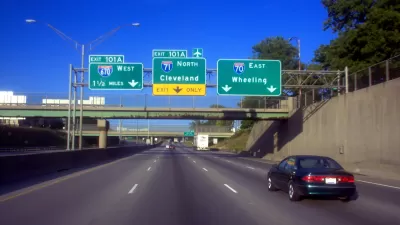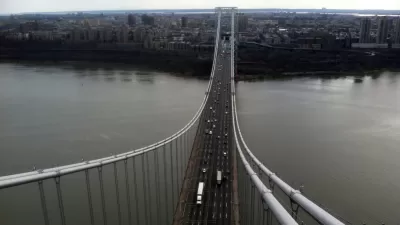Obama has compared the size of the stimulus package he wants to the 1956 National Highway Act. If the states have their way, it may be just that -- a new highway bill with little left for transit.
"Missouri's plan is to spend $750 million in federal money on highways and nothing on mass transit in St. Louis. Utah would pour 87 percent of the funds it may receive in a new economic stimulus bill into new road capacity.
While many states are keeping their project lists secret, plans that have surfaced show why environmentalists and some development experts say much of the stimulus spending may promote urban sprawl while scrimping on more green-friendly rail and mass transit."
"It's a lot of more of the same," said Robert Puentes, a metropolitan growth and development expert at the Brookings Institution in Washington who is tracking the legislation. "You build a lot of new highways, continue to decentralize" urban and suburban communities and "pull resources away from transit."
Highway advocates note that their projects are 'ready-to-go'.
"Polly Trottenberg, director of Building America's Future, a Washington-based group promoting innovation in infrastructure improvements, counters that "there are plenty of projects that can put Americans back to work immediately and also start the transformation that is needed."
Her organization and other groups have pinpointed $16.5 billion in mass-transit projects on which work can start within a year, and in many cases within four months.
They also are backing a provision in the stimulus legislation that would require states to spend funds on maintenance before building new roads. And they also want to direct funds to metropolitan planning authorities and to create a national oversight group to help coordinate the spending."
[Correspondent's note: The article confirms many of the issues raised earlier by NYT columnist David Brooks in this article].
Thanks to Tony Donovan
FULL STORY: Rail Takes Back Seat as States Target Obama Stimulus for Roads

Planetizen Federal Action Tracker
A weekly monitor of how Trump’s orders and actions are impacting planners and planning in America.

Maui's Vacation Rental Debate Turns Ugly
Verbal attacks, misinformation campaigns and fistfights plague a high-stakes debate to convert thousands of vacation rentals into long-term housing.

San Francisco Suspends Traffic Calming Amidst Record Deaths
Citing “a challenging fiscal landscape,” the city will cease the program on the heels of 42 traffic deaths, including 24 pedestrians.

Defunct Pittsburgh Power Plant to Become Residential Tower
A decommissioned steam heat plant will be redeveloped into almost 100 affordable housing units.

Trump Prompts Restructuring of Transportation Research Board in “Unprecedented Overreach”
The TRB has eliminated more than half of its committees including those focused on climate, equity, and cities.

Amtrak Rolls Out New Orleans to Alabama “Mardi Gras” Train
The new service will operate morning and evening departures between Mobile and New Orleans.
Urban Design for Planners 1: Software Tools
This six-course series explores essential urban design concepts using open source software and equips planners with the tools they need to participate fully in the urban design process.
Planning for Universal Design
Learn the tools for implementing Universal Design in planning regulations.
Heyer Gruel & Associates PA
JM Goldson LLC
Custer County Colorado
City of Camden Redevelopment Agency
City of Astoria
Transportation Research & Education Center (TREC) at Portland State University
Jefferson Parish Government
Camden Redevelopment Agency
City of Claremont





























